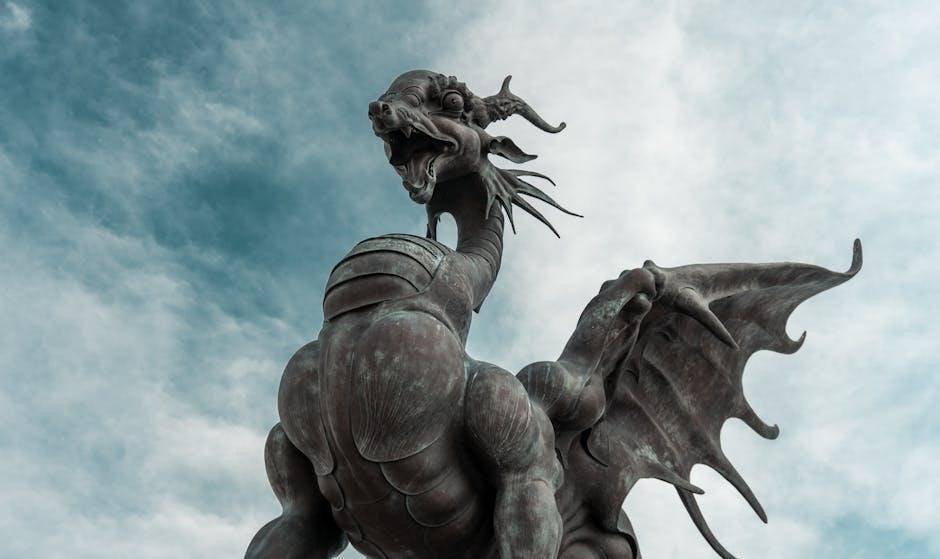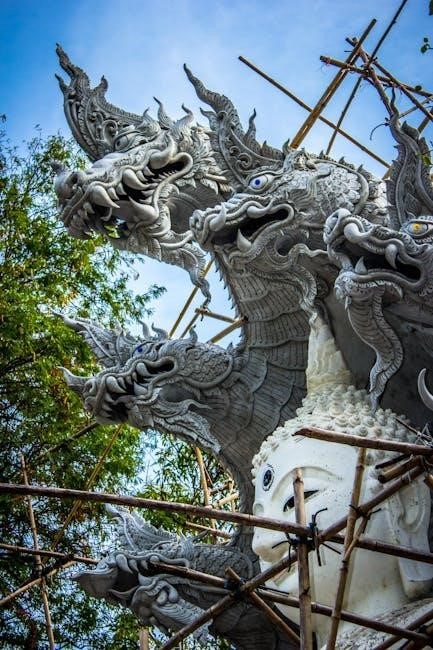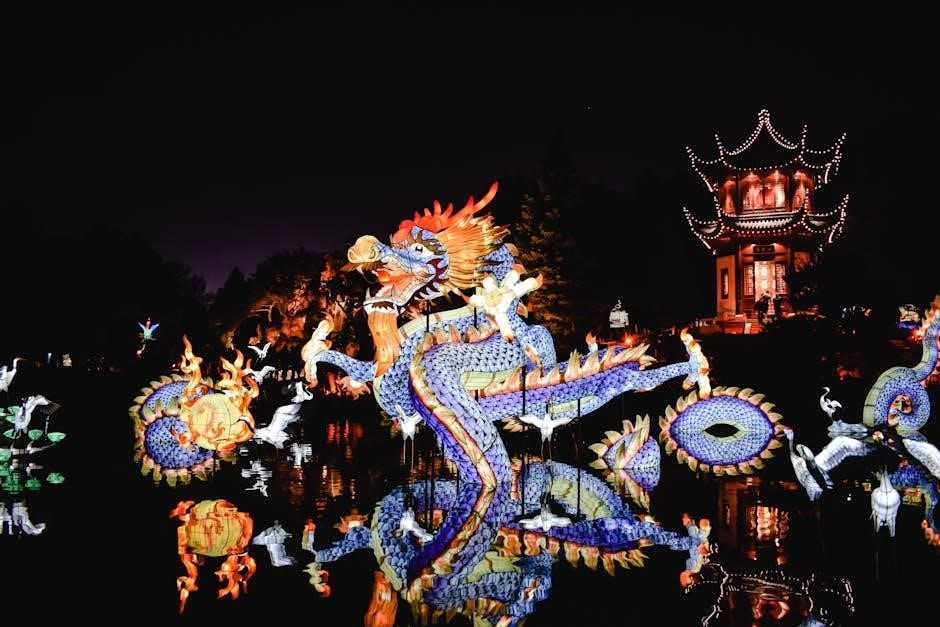the dragon republic pdf

the dragon republic pdf
The Dragon Republic by R․F․ Kuang is a highly acclaimed fantasy novel, part of The Poppy War trilogy․ It explores themes of war, power, and addiction, set in a world inspired by Chinese history and mythology․ The PDF version is widely sought after for its convenience, offering readers a gripping continuation of Rin’s journey as she grapples with trauma and leadership․ This section introduces the book’s premise, its place in the series, and its cultural significance․

1․1 Overview
The Dragon Republic by R․F․ Kuang is a gripping fantasy novel that continues the story of Rin, a young shaman and warrior, in a world inspired by Chinese history and mythology․ The PDF version of this book has gained popularity for its accessibility and immersive storytelling․ It explores themes of war, imperialism, and personal trauma, delving deeper into Rin’s struggles with opium addiction and her role in shaping the fate of her world․ The novel is the second installment in The Poppy War trilogy, praised for its vivid world-building and complex characters․ Fans and critics alike have lauded it for its unflinching portrayal of violence and power dynamics, making it a standout in modern fantasy literature․
1․2 Historical Context
The Dragon Republic is deeply rooted in Chinese history and mythology, drawing parallels to historical events like the Chinese Civil War and the collapse of dynasties․ R․F․ Kuang weaves these influences into a fantastical narrative, exploring themes of imperialism, power struggles, and war․ The novel reflects on the cyclical nature of violence and political upheaval, resonating with readers familiar with China’s turbulent past․ This historical backdrop enriches the story, providing a compelling setting for Rin’s journey and the broader conflicts shaping her world․ The PDF format captures these elements seamlessly, offering readers a vivid exploration of history intertwined with fantasy․
1․3 Genre
The Dragon Republic blends elements of historical fiction, fantasy, and war fiction, creating a unique and immersive narrative․ The novel falls under the epic fantasy genre, with a strong emphasis on political intrigue, military strategy, and mythological influences․ R․F․ Kuang’s writing style incorporates dark fantasy themes, exploring the harsh realities of war, addiction, and power struggles․ The PDF version of the book captures these genre elements vividly, offering readers a gripping story that combines historical inspiration with fantastical world-building․ This blend of genres appeals to fans of complex, thought-provoking storytelling and those drawn to tales of war, magic, and personal struggle․
1․4 Series Context
The Dragon Republic is the second installment in The Poppy War trilogy by R․F․ Kuang, following the events of the first book․ It continues the story of Rin, a young orphan who rises to become a powerful shaman and military leader․ The novel delves into the aftermath of the Third Poppy War, exploring Rin’s struggles with addiction, trauma, and her role in shaping the fate of her world․ As the sequel, The Dragon Republic expands on the political and mythological landscape introduced in the first book, setting the stage for the trilogy’s conclusion․ The PDF format of this book is highly sought after, offering readers seamless access to Rin’s gripping journey and the richly detailed worldbuilding․

Plot and Characters
The Dragon Republic follows Rin, a shaman and warrior, as she navigates the aftermath of the Third Poppy War․ The story explores her addiction, leadership struggles, and the devastating consequences of war, while introducing a cast of complex characters that shape her journey and the fate of her world․
2․1 Plot Summary
The Dragon Republic picks up in the aftermath of the Third Poppy War, where Rin, a shaman and warrior, is haunted by the atrocities she committed․ Struggling with opium addiction and the weight of her actions, she must navigate a fractured world on the brink of collapse․ The story delves into her journey as she confronts internal demons and external threats, including political intrigue and looming war․ Rin’s quest for survival and redemption is intertwined with the fate of her nation, exploring themes of power, identity, and the cost of leadership․ The novel’s gripping narrative weaves together personal struggles with epic battles, creating a rich and immersive tale of war, magic, and betrayal;
2․2 Main Characters
Rin, the protagonist, is a complex and deeply flawed character, haunted by her past and struggling with addiction․ Her journey from a young orphan to a powerful shaman is central to the story; Kitsen, her former lover, plays a significant role, offering both support and conflict․ Jiang Ziya, a mysterious and powerful figure, serves as a mentor but hides his own motives․ Niko and Kurin are loyal allies, each grappling with their own traumas․ These characters, along with others, drive the narrative, each facing personal and political challenges that shape the world of The Dragon Republic․ Their interactions and growth are pivotal to the story’s exploration of war, identity, and redemption․
2․3 Character Development
Rin undergoes significant growth, grappling with her addiction to opium and the moral weight of her actions․ Her internal struggle between power and vulnerability defines her arc․ Kitsen evolves from a distant figure to someone deeply invested in Rin’s survival, revealing his own vulnerabilities․ Niko and Kurin face their own traumas, showing resilience and loyalty․ Even Jiang Ziya, an enigmatic mentor, hints at hidden depths․ The characters’ development is shaped by their experiences of war, loss, and identity, making them relatable and multi-dimensional․ Their journeys explore themes of redemption, sacrifice, and the cost of power, enriching the story’s emotional depth․
2․4 Themes and Motifs
The Dragon Republic delves deeply into themes of imperialism, power, and identity, reflecting the turmoil of its war-torn world․ Addiction and trauma are central motifs, with Rin’s opium dependence symbolizing broader societal struggles․ The novel explores the cyclical nature of violence and the moral ambiguities of war, questioning whether ends justify means․ Mythology and fantasy intertwine with historical elements, enriching the narrative․ These themes are woven through character arcs and plot twists, creating a rich tapestry that invites readers to reflect on humanity’s darker aspects and the resilience of the human spirit․ The book’s exploration of these motifs adds depth and complexity to its epic storytelling․

Themes and Motifs
The Dragon Republic explores themes of imperialism, addiction, and war, weaving fantasy with historical inspiration․ Mythology and power struggles drive the narrative, reflecting deep human complexities․
3․1 Imperialism and Power
The Dragon Republic delves into the destructive nature of imperialism, mirroring historical events through its fictional world․ The struggle for dominance between nations and factions underscores the cost of expansion and control․ Power dynamics are central, with characters like Rin navigating the complexities of leadership and corruption․ The novel critiques the exploitation inherent in imperial systems, highlighting how marginalized groups suffer․ Through its fantasy lens, the book provides a sharp commentary on real-world colonialism and the cyclical nature of power struggles, making it a compelling and thought-provoking read․
3․2 Addiction and Trauma
The Dragon Republic explores the profound impact of addiction and trauma on its characters, particularly Rin, who grapples with opium dependency and the psychological scars of war․ The novel portrays addiction as both a coping mechanism and a destructive force, deeply intertwined with the characters’ emotional and moral struggles․ Trauma is a pervasive theme, shaping decisions and relationships while highlighting the long-lasting effects of violence and loss․ Through Rin’s journey, the book examines how individuals and societies attempt to heal and rebuild in the aftermath of devastation, offering a poignant reflection on resilience and the cyclical nature of pain․
3․3 War and Violence
The Dragon Republic delves into the harrowing consequences of war and violence, depicting the brutal realities of conflict and its impact on individuals and society․ The novel explores the physical and emotional toll of battle, as characters grapple with the moral ambiguities of violence․ Rin’s journey is marked by her struggle to reconcile her actions during the war with her sense of self, while the broader world faces the devastating aftermath of the Third Poppy War․ The book examines how violence perpetuates cycles of revenge and destruction, offering a stark commentary on the true cost of war and its enduring legacy on nations and their people․
3․4 Mythology and Fantasy
The Dragon Republic seamlessly intertwines Chinese mythology with gripping fantasy elements, creating a rich and immersive world․ Drawing from mythological creatures like dragons and phoenixes, the novel explores the spiritual and divine forces that shape its universe․ The protagonist, Rin, interacts with these mythological beings, blending historical fiction with fantastical elements․ The book delves into the mystical connection between gods, shamans, and the natural world, adding depth to its narrative․ This fusion of mythology and fantasy not only enhances the storytelling but also serves as a metaphor for the struggles between humanity and the divine, making the world feel both familiar and extraordinary․ The result is a captivating tale that balances tradition with imaginative creativity․

Author Background
R․F․ Kuang is a celebrated fantasy author known for her immersive storytelling and unique voice․ She attended prestigious institutions like Georgetown, Cambridge, and Oxford, shaping her literary expertise․ Her works, including The Dragon Republic and The Poppy War, blend historical and mythological elements, earning her a loyal following and critical acclaim in the fantasy genre․
4․1 Early Life and Education
R․F․ Kuang was born in Guangzhou, China, and later moved to the United States with her family․ She grew up in Hawaii and developed a passion for storytelling from a young age․ Kuang pursued higher education at Georgetown University, where she studied Chinese history and folklore, laying the groundwork for her richly detailed world-building․ She later attended the University of Cambridge and Oxford University, further refining her academic and creative skills․ Her educational background, combined with her cultural heritage, heavily influenced her writing style and the thematic depth of works like The Dragon Republic․
4․2 Literary Career
R․F․ Kuang’s literary career began with the debut of The Poppy War in 2018, which earned critical acclaim and commercial success․ The novel won the Nebula Award for Best Novel, establishing Kuang as a prominent voice in fantasy literature․ Her sophomore release, The Dragon Republic, further solidified her reputation, praised for its unflinching exploration of war, power, and identity․ Kuang’s work often blends elements of Chinese history and mythology with dark, gritty storytelling, resonating with readers worldwide․ Her unique voice and perspective have garnered widespread recognition, making her a key figure in modern fantasy․ Her writing continues to captivate audiences, blending cultural depth with compelling narratives․
4․3 Other Notable Works
Beyond The Dragon Republic, R;F․ Kuang has made significant contributions to fantasy literature․ Her debut novel, The Poppy War, launched her career and earned widespread acclaim․ Kuang also authored Babel, a dark academic fantasy exploring themes of language and empire, released in 2022․ Additionally, she wrote The Burning God, the final installment of The Poppy War trilogy, which concluded Rin’s epic journey․ These works showcase Kuang’s ability to weave compelling narratives that blend cultural depth with fantasy elements․ Her writing continues to captivate readers and solidify her reputation as a leading voice in the fantasy genre, offering fresh perspectives on power, identity, and history․
4․4 Writing Style
R․F․ Kuang’s writing style in The Dragon Republic is a masterful blend of historical fiction and fantasy, deeply influenced by Chinese history and mythology․ Her prose is lyrical yet unflinching, tackling themes of war, trauma, and addiction with raw honesty․ Kuang’s ability to interweave action-packed sequences with philosophical and political commentary sets her apart․ Her characters are morally complex, with flawed yet relatable motivations․ The narrative voice is both intimate and expansive, capturing the personal struggles of Rin while painting a vast, war-torn world․ This unique style has garnered praise for its emotional depth and cultural authenticity, making her work a standout in modern fantasy literature․

Reception and Reviews
The Dragon Republic has been highly praised for its emotional depth and cultural authenticity․ Reviewers acclaim its unflinching portrayal of war, trauma, and power, solidifying its place as a modern fantasy standout․
5․1 Critical Reception
Critics have lauded The Dragon Republic for its masterful storytelling and unflinching exploration of war, addiction, and power․ R․F․ Kuang’s prose is praised for its vivid imagery and emotional depth․ Reviewers highlight the novel’s ability to expand on the world-building introduced in The Poppy War, offering a darker, more mature narrative․ The character development, particularly Rin’s struggle with opium addiction and her internal conflict, has been singled out for acclaim․ The book’s historical and mythological influences, drawing from Chinese history and folklore, have been commended for their authenticity and depth․ Overall, the critical reception underscores The Dragon Republic as a standout in modern fantasy literature․
5․2 Fan and Community Reception
Fans of The Dragon Republic have enthusiastically embraced the novel, praising its raw emotional depth and compelling character development․ The book has sparked lively discussions across online forums and social media, with readers sharing theories and fan art․ Many appreciate how R․F․ Kuang tackles uncomfortable themes like addiction and trauma, resonating deeply with audiences․ The PDF version has been particularly popular, with fans seeking convenient access to revisit Rin’s journey․ Community engagement has grown significantly, fostering a dedicated fanbase that celebrates the series’ unique blend of fantasy and historical elements․ The book’s ability to evoke strong emotions has solidified its place as a fan favorite in the fantasy genre․
5․3 Comparisons to Other Works
The Dragon Republic is often compared to other epic fantasy series like A Song of Ice and Fire and The Wheel of Time for its intricate world-building and complex characters․ Fans note similarities in its exploration of war, politics, and morality, while praising its unique blend of Chinese history and mythology․ The novel’s focus on trauma and addiction also draws parallels to works like The First Law trilogy by Joe Abercrombie․ However, Kuang’s writing stands out for its unflinching portrayal of colonialism and its impact on individuals and societies․ These comparisons highlight how The Dragon Republic offers a fresh perspective within the fantasy genre while maintaining the depth and complexity readers expect from epic storytelling․

5․4 Awards and Recognition
The Dragon Republic has garnered significant acclaim, earning nominations for prestigious awards such as the Nebula Awards and the World Fantasy Awards․ Its predecessor, The Poppy War, won the Nebula Award for Best Novel, setting a high standard for the sequel․ The book has also been featured on bestseller lists, including The New York Times, and praised by critics for its raw storytelling and cultural depth․ Fans and literary communities celebrate its unique voice and unflinching exploration of war and colonialism․ This recognition solidifies its place as a standout work in modern fantasy literature․

Cultural Impact
The Dragon Republic has sparked global discussions on colonialism and identity, resonating deeply with readers․ Its popularity has driven high demand for fantasy books with diverse perspectives, influencing the genre’s direction․ Fan communities celebrate its themes through art and discussions, cementing its cultural relevance and inspiring new storytelling in popular culture․
6․1 Popularity and Demand
The Dragon Republic has garnered significant popularity worldwide, with high demand for its PDF version due to its portability and accessibility․ Readers drawn to its rich, immersive world and complex characters have fueled its success․ The book’s exploration of colonialism, power, and identity resonates deeply, making it a favorite among fantasy enthusiasts․ Its popularity extends across regions, with translations and international releases further boosting its reach․ The demand for digital formats, including PDF, reflects modern reading preferences, ensuring its widespread accessibility and contributing to its enduring appeal in the fantasy genre․

6․2 Influence on Popular Culture
The Dragon Republic has left a significant mark on popular culture, particularly in the fantasy genre, with its unique blend of Chinese history, mythology, and dark fantasy elements․ The novel’s exploration of colonialism, power, and identity has inspired creators across media, from authors to screenwriters․ Its morally ambiguous characters and gritty storytelling have influenced character development in modern fiction․ The book’s success has also sparked discussions about representation and diversity in literature․ Fan art, fan fiction, and online communities dedicated to the series highlight its cultural impact․ Furthermore, its themes have resonated in academic circles, fostering debates about historical parallels and societal issues․ This influence underscores the novel’s role in shaping contemporary storytelling and cultural discourse․
6․3 Fandom and Community Engagement
The Dragon Republic has fostered a dedicated fan base, with readers actively engaging in discussions, fan art, and fan fiction․ Online communities, such as Reddit and Discord, host vibrant debates about the series, exploring its themes, characters, and cultural nuances․ Fans have created countless pieces of art inspired by Rin, Kitay, and other characters, showcasing their emotional connection to the story․ The novel’s exploration of identity, trauma, and power resonates deeply, leading to personal reflections and shared experiences among readers․ This collective engagement highlights the book’s ability to inspire creativity and foster a sense of belonging within its fandom, further cementing its impact on modern fantasy culture․

Availability and Formats
The Dragon Republic is available in multiple formats, including print, digital (PDF, ePub), and audiobook․ Fans can access it via platforms like Litres, Amazon, and local bookstores, ensuring wide accessibility for readers worldwide․
7․1 Print Editions
The Dragon Republic is widely available in print editions, including hardcover and paperback formats․ The hardcover edition, published by HarperCollins, features striking cover art that reflects the novel’s themes of war and mythology․ Paperback editions are equally popular, offering a portable and affordable option for readers․ Special editions, such as those with alternate covers or bonus content, have also been released for collectors․ Fans can purchase print copies from major bookstores, online retailers like Amazon, or local indie bookstores․ The physical editions are praised for their high-quality production, making them a cherished addition to any fantasy reader’s collection․
7․2 Digital Formats
The Dragon Republic is accessible in various digital formats, catering to modern readers’ preferences․ The eBook is available in formats like ePub and PDF, compatible with devices such as Amazon Kindle, Apple Books, and Kobo․ Platforms like Litres and ReadBUX offer the book for direct download or online reading․ Audiobook versions are also popular, allowing listeners to experience the story through immersive narration․ Digital formats ensure convenience, enabling readers to carry the novel across multiple devices․ This accessibility has broadened the book’s reach, appealing to a global audience and enhancing its cultural impact within the fantasy genre․
7․3 Audiobook Availability
The Dragon Republic is available as an audiobook, offering an immersive listening experience․ Platforms like Google Play Books, Apple Books, and Audible provide the audiobook for purchase or subscription․ Narrators bring the story to life, enhancing the emotional depth of Rin’s journey․ The audiobook format is particularly popular among fans who enjoy consuming stories on-the-go․ While some users have reported difficulty finding free downloads, official platforms ensure high-quality access․ This format has contributed to the book’s global reach, making it accessible to audiences who prefer listening over reading․ The audiobook’s popularity underscores the growing demand for versatile storytelling formats in modern literature․
7․4 Translations and International Releases
The Dragon Republic has been widely released internationally, with translations in multiple languages, including Russian, French, and German․ The book’s global popularity has led to its availability in various regions, catering to diverse readerships․ In Russia, the book is offered through services like Litres, allowing readers to access it in formats like ePub and PDF․ The novel’s success in the U․S․ and U․K․ markets has driven its international distribution, ensuring fans worldwide can engage with Rin’s story․ Additionally, the audiobook version has further expanded its global reach, making the story accessible to listeners across different countries and languages․
The Dragon Republic by R․F․ Kuang stands as a monumental achievement in modern fantasy literature, blending vivid storytelling with profound thematic depth․ Its exploration of war, trauma, and power resonates deeply with readers, solidifying its place in The Poppy War trilogy․ The novel’s accessibility in PDF and other formats has fueled its global popularity, making it a staple for fans of historical and mythological fiction․ Kuang’s masterful writing continues to captivate audiences, ensuring The Dragon Republic remains a timeless and influential work in the genre․ Its cultural impact and enduring appeal underscore its importance as a must-read for anyone drawn to epic, emotionally charged narratives․